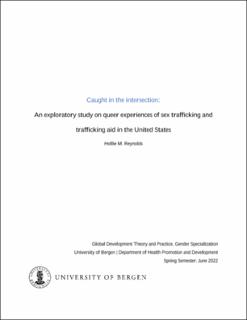| dc.description.abstract | Background: In the United States, LGBTQIA+ youth makeup a disproportionately large percentage of the homeless youth population; homelessness is considered one of the highest risk factors for human trafficking; yet, there is significantly little research written on the experiences of queer trafficking survivors. Purpose of Research: The purpose of this study is, therefore, to examine the role of gender identity and sexual orientation in queer experiences of sex trafficking in the United States, as well as how these factors influence a survivor’s ability to access and participate in trafficking aid programs. Method: Five, in-depth interviews were conducted with staff members of organizations working with LGBTQIA+ trafficking survivors. Four out of five participants identified as queer with personal experience working in the sex trade, and two participants identified as survivors of trafficking. Interviews were coded and analyzed using thematic network analysis. Findings and Discussion: Three major themes arose from the analysis in this study. First, there are two distinct and conflicting approaches to sex trafficking aid: the anti-trafficking approach and the sex worker rights approach. The divide between these two groups contribute to the gaps in research and service provision for LGBTQIA+ survivors. Second, there are specific differences between queer and cishet experiences of sex trafficking, such as the emotional complexities surrounding experiences of gender affirmation while being trafficked. Third, there are specific barriers to aid that queer survivors face when seeking help, including fear of harassment and sexual assault by law enforcement and discriminatory practices by aid programs, such as requiring transgender survivors to detransition while participating in the program. Conclusion: The findings in this study suggest that gender identity and sexual orientation influence both an individual’s personal experience of sex trafficking and their experiences of trafficking aid. Further research should adopt a collaborative perspective between anti-trafficking and sex worker rights approaches to ensure greater visibility and inclusivity of queer survivors. | |
